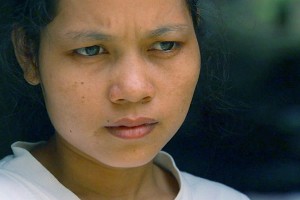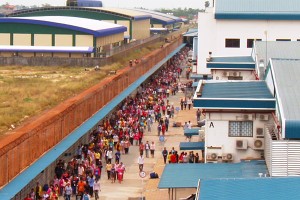

Top: ESPN: Kol Malay and her colleagues log regular, 60-hour work weeks, sewing 10 hours a day, six days a week to earn about $100 a month -- about the cost of a Dallas Cowboys jacket.
Bottom: ESPN:Thousands of apparel workers leave the factories after a day's work in Cambodia.
Bottom: ESPN:Thousands of apparel workers leave the factories after a day's work in Cambodia.
By Mark Fainaru-Wada and Justine Gubar
Watch video at ESPN.com
PHNOM PENH, Cambodia -- It was eight years ago when Kol Malay, all of 20 and toting along no more than a seventh-grade education, set off for the big city. She rode for three days in an oxen cart, traversing the 70 miles from her home province of Svay Rieng to the garment district of the country's capital.
Svay Rieng is one of Cambodia's poorest provinces, a region limited by inferior soil, where "most of the provincial population eke out a subsistence living based on farming and fishing," according to a tourism website.
Malay is one of 10 children, and like most families from Cambodia's outlying areas, hers survives through farming, primarily producing rice. Eight in 10 Cambodians rely on agriculture to live, and rice is one of the nation's primary exports.
But with her family struggling, Malay followed the path of many other young women in Cambodia -- leaving the provinces and heading for Phnom Penh to find work producing her country's most critical export: clothing.
Eight years later, life is no simpler for Malay. She and her colleagues work harder than perhaps most people you know, logging regular 60-hour work weeks, sewing 10 hours a day, six days a week. They fear the wrath of their supervisors if they talk to a co-worker sitting next to them or take too long at the bathroom. They say they are essentially forced to work overtime daily and describe a hostile work environment in which supervisors yell and insult them. They work while sick because either they can't afford to go to the doctor or fear they will be fired if they miss work. They rent small rooms with sometimes as many as three other workers, eat substandard food and have irregular water and electricity.
All of this to make the clothes on your back, which just might include the Dallas Cowboys Sideline Kickoff Midweight Jacket you scored for Christmas, the one that sells for $100 -- or about what Malay will earn in one month.
Indeed, not just for America's Team but for nearly every sports team in America, virtually all of the jackets, jerseys, hats, pants and, yes, even bathrobes bearing your favorite team's insignia are made in factories abroad. Kol Malay, then, is the unseen face of a multibillion-dollar industry: The laborer who earns the minimum wage -- in Malay's case, 29 cents an hour -- who lives below the poverty level, who wouldn't know a Dallas Cowboy from a Dallas Maverick, and who has no real hopes of emerging from the cycle.
With the two hours of "voluntary" overtime she works daily, Malay brings home about $100 a month, which, according to one watchdog group is at least a third of what's required for a "living wage" in Phnom Penh.
"I can sew as many as 1,000 or 1,100 to 1,200 depending on the types of shirt," Malay says through an interpreter of the daily quota of parts of a shirt she completes. "To make so little money out of so many shirts made is an insult. I make thousands [of shirts], and they can sell each shirt for $70 to $80."
The issue is hardly isolated to the Cowboys, who, like most other major brands such as Nike and adidas, contract with independently owned factories around the world to get their merchandise made.
"The norm across the global apparel industry is your typical sweatshop, where workers are paid poverty wages," says Teresa Cheng, the international campaigns coordinator for United Students Against Sweatshops. "There's rampant sexual harassment. A lot of times there's even physical abuse.
"A couple decades ago, we first heard about all these sensational scandals about Nike sweatshops, and I would say, two decades later, not much has changed."
"Outside the Lines" traveled to Cambodia as part of an investigation into the use of sweatshop labor to produce sports merchandise, with particular focus on the Dallas Cowboys and recent criticism the team has drawn as it expands its reach into producing college apparel.
In May, after earlier creating an ancillary company called Silver Star Merchandising, the Cowboys struck a 10-year deal with USC to become the primary licensee of Trojans apparel. The team has its sights set on signing a handful of top-flight college programs.
"I think that we will definitely sign new schools in the future," says Bill Priakos, who runs the Cowboys' merchandising operation. "… I think that this model kind of maxes out around 10. … And that's really it, because really, you have to stay focused. You have to -- we've got a real passion for this, and we want to make sure that we're speaking to the … alumni, the current student, the future student. And there's a real passion that's about that, and I only have so much of that passion."
The Cowboys, though, have run into a buzz saw of passion since they embarked on their collegiate plan, exposing themselves to scrutiny from labor rights organizations who believe the team has failed to adequately address reported violations against workers at factories they use.
Priakos has been in talks with Ohio State for more than a year, trying to convince the Buckeyes to sign on, but those efforts have been muddied by student protests and media attention on the Cowboys' practices.
In June, Ohio State Students Against Sweatshops -- a branch of the national organization Cheng serves -- wrote to OSU president Gordon Gee, suggesting a deal with the Cowboys would be "a huge step backwards in the university's efforts to end sweatshop abuse in our college gear supply chain." The students described the Cowboys as "a company with no track record of social responsibility" and pointed to at least one reported violation at a factory used by the team.
When Rick Van Brimmer, OSU's director of trademark and licensing, forwarded the letter to Priakos, the Cowboys exec responded via email, "Good grief. How would you like me to respond?"
Van Brimmer, who some OSU students have suggested developed a far too cozy relationship with Priakos, wrote back, "maybe you could shed some light on the allegations that I could share with the administration/evaluation committee."
Priakos did not help himself when he provided a detailed response that included the claim that, "Upon review, you will see that we have had very stringent conduct rules in place for 10 years, with NOT ONE violation of workers rights during that time. Not one." OTL obtained these emails through public records requests to Ohio State.
The response was ridiculed publicly and privately to "Outside the Lines" as naïve, at best, and arrogant, at worst. From labor rights organizations to representatives of other major brands, from licensing directors at big-time colleges to academics who have studied this issue for years, the message was the same: Violations are everywhere, it's the reality of the business, and no one has denied that for years.
"I feel like we're going back in time 15, 20 years," says Penn State assistant professor Mark Anner, who is the coordinator of the school's Project for Global Workers' Rights. "I've been researching, examining, looking at this industry for close to 20 years now, and I would have to say that's impossible. I've looked at auditing reports where I've seen, perhaps on average, 18 violations per factory. So problems, violations are extremely common. This is one of the most hypercompetitive industries in the global economy."
Priakos says the email is taken out of context from "extensive discussions" the Cowboys have had with Ohio State over the year and a half the organizations have been talking.
[+] EnlargeCowboys Sweatshops Protest
ESPNThe Cowboys have been trying to win a contract with Ohio State for more than a year, a possibility that has drawn protests over how the Cowboys' merchandising program is operated.
"If they feel like we don't do the right thing, then they should protest," Priakos told OTL, adding that he invited some students to travel with him to a factory in Guatemala, but they declined. "You know, I think, once they learn about us and they know that we're interested in the stakeholders. … We really do want something they can be proud of."
Regardless, Priakos says the team takes the issue very seriously and wants to be on the side of change.
"We're a small company trying -- I don't have the resources that Nike does," Priakos says. "But we've spoken to Nike, and we're trying to learn from them. And we've spoken with adidas, and we're trying to learn from them. We're trying to learn from everybody. We're humble like that. We think, we know we can do better."
At the core of the discussion, then, are women such as Malay and the thousands of others who work alongside her at the Bright Sky factory in the garment district of Phnom Penh. More than 300,000 Cambodians toil away producing everything from sports gear to baby wear.
Through interviews with Malay and a half-dozen other women who worked at one of two factories used here by the Cowboys, a clear and bleak picture emerged: forced overtime, harassment by supervisors, fear of reprisal if they complain about working conditions and a life of general squalor.
Typically, the workers live in complexes called "dormitories," which are 10-by-10-foot, windowless rooms shared with at least one other person to offset costs. Malay's room is at the end of a long path of rooms, in buildings sandwiched between fields that are littered with piles of reeking garbage.
There are no kitchens to speak of, electricity comes and goes, as does water, which runs from faucets outside the dorms and is shared with others. Malay lives with her husband (a bike messenger from the provinces). Rent is $30 a month; electricity and water $5 a month, sometimes more; if they spend $2.50 a day on food, that's another $75; toss in clothes and other necessities, and there's not much breathing room.
"I haven't been sending money home," says Malay, who says she sometimes has to borrow money through the factory or others in the loan business -- at the typical rate of 20 percent interest. "I've never gone anywhere. … Ever since I got here, I went to work, to the market to buy some food and then go back home. I bought a nice set of clothes for the holidays, and that's it.
"I want to go to school, but I don't have time to go."
Mark Fainaru-Wada is an investigative reporter with ESPN's enterprise unit, and Justine Gubar is a producer with the unit. Fainaru-Wada can be reached at markfwespn@gmail.com, Gubar at justinegubar@gmail.com

No comments:
Post a Comment